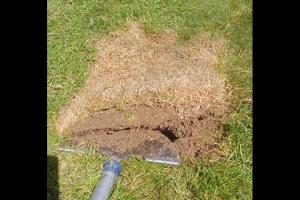What is Smart Water Metering?

Water is a precious resource that sustains all forms of life. However, with the world's population growing, water scarcity is becoming a major concern. To tackle this issue, smart metering technology has emerged as a game-changer in the field of water management. Smart meters provide an accurate and timely measure of water consumption, allowing consumers to monitor and manage their water usage effectively. In this article, we'll explore how smart metering technology can revolutionize the way we manage our water resources, promote sustainable water usage practices, and ultimately, help conserve this precious resource for generations to come.
1 . Definition of smart metering technology
Smart metering technology is an advanced metering infrastructure that measures and records water usage accurately and in real-time. Unlike traditional water meters, which require manual reading and are prone to human error, smart meters provide automated readings that are transmitted to utility companies for billing and analysis purposes.
2 . How smart metering worksSmart meters use wireless communication technology to transmit data on water usage to a central server. The data is then analyzed and used for billing purposes, leak detection, and water conservation initiatives. Consumers can access their water usage data through a web portal or mobile app, allowing them to monitor their usage and make informed decisions about their water consumption habits.
3 . Benefits of smart meteringSmart metering technology has several benefits, including:
Accurate and timely measure of water consumption Improved leak detection and water loss prevention Real-time monitoring of water usage Reduced water bills for consumers More efficient billing and revenue collection for utility companies Enhanced data analysis for water management and conservation initiatives 4 . Water conservation and smart meteringSmart metering technology can help promote water conservation by providing consumers with real-time information on their water usage. By monitoring their usage, consumers can identify areas where they can reduce their consumption and make changes to their habits to conserve water. For example, a household may realize that they are using too much water for irrigation and adjust their system accordingly, reducing their overall water consumption.
5 . The impact of smart metering on water billingSmart metering technology has revolutionized the way water billing is done. With traditional water meters, customers are billed based on estimated usage, which can result in inaccurate billing and disputes. Smart meters provide accurate readings, allowing customers to pay for only the water they use, resulting in fairer and more efficient billing practices.
6 . Smart metering and leak detectionSmart meters can detect leaks in real-time, allowing consumers to identify and address leaks before they become major issues. This not only helps to conserve water but also reduces the cost of repairs and potential damage to property.
7 . Smart metering and irrigation systemsSmart metering technology can be integrated with irrigation systems to monitor and manage water usage for landscaping and agricultural purposes. By using smart irrigation controllers and sensors, consumers can optimize their water usage and reduce water waste. This can lead to significant water conservation in areas where irrigation is a major water consumer.
8 . The role of smart metering in water conservation programsSmart metering technology is a critical component of water conservation programs. By providing real-time data on water consumption, smart meters can help utility companies and municipalities identify areas of high water usage and implement targeted conservation initiatives. This can lead to significant water savings and help meet sustainability goals.
9 . The challenges of implementing smart metering technologyWhile the benefits of smart metering technology are clear, there are several challenges to implementing it on a large scale. The installation of smart meters requires significant investment in infrastructure and technology. Additionally, there may be resistance from consumers who are wary of the new technology or concerned about privacy issues.
10 . Cost implications of smart meteringThe implementation of smart metering technology can be costly, both for utility companies and consumers. While the technology can lead to long-term cost savings and increased efficiency, the initial investment can be significant. This can lead to debates about who should bear the cost of implementing the technology and how it should be funded.
11 . The future of smart metering technologyThe future of smart metering technology looks bright. As the world becomes more focused on sustainability and water conservation, smart metering technology is likely to become more widespread. Advancements in technology, such as the Internet of Things (IoT), can lead to further improvements in smart metering, such as increased automation and data analysis.
12 . Case studies of successful smart metering implementationsThere have been several successful implementations of smart metering technology around the world. For example, the City of San Diego implemented smart metering technology in 2011, resulting in a 20% reduction in water consumption. In the UK, smart metering technology has been implemented by several water companies, resulting in significant water savings and improved billing accuracy.
13 . Comparison of smart metering with traditional water metering methodsSmart metering technology offers several advantages over traditional water metering methods. Smart meters provide accurate, real-time data on water usage, reducing disputes and improving billing accuracy. Additionally, smart meters can detect leaks in real-time, reducing water loss and potential damage to property.
14 . Smart metering and environmental sustainabilitySmart metering technology is a critical component of environmental sustainability. By promoting water conservation and reducing water waste, smart meters can help protect the environment and promote a more sustainable future. Additionally, smart metering can help reduce the energy needed to treat and transport water, leading to further environmental benefits.
15 . ConclusionIn conclusion, smart metering technology is a game-changer in the field of water management. By providing accurate, real-time data on water usage, smart meters can help promote water conservation, reduce water waste, and improve billing accuracy. While there are challenges to implementing smart metering on a large scale, the benefits are clear. As the world becomes more focused on sustainability and environmental protection, smart metering technology is likely to become more widespread.
16 . FAQs How does smart metering technology work?Smart metering technology measures and records water usage accurately and in real-time, transmitting the data to a central server for analysis and billing purposes.
How can smart metering technology help promote water conservation?By providing consumers with real-time data on their water usage, smart metering technology can help identify areas of high usage and promote changes in behavior to conserve water.
What are the benefits of smart metering technology?Smart metering technology provides accurate and timely data on water usage, improves billing accuracy, reduces water waste, and promotes water conservation.
What are the challenges of implementing smart metering technology?The installation of smart meters requires significant investment in infrastructure and technology, and there may be resistance from consumers who are wary of the new technology or concerned about privacy issues.
How can smart metering technology help with leak detection?Smart meters can detect leaks in real-time, allowing consumers to identify and address leaks before they become major issues, reducing water loss and potential damage to property.
What is the future of smart metering technology?The future of smart metering technology looks bright, as the world becomes more focused on sustainability and water conservation. Advancements in technology, such as the Internet of Things (IoT), can lead to further improvements in smart metering, such as increased automation and data analysis.
What are some successful implementations of smart metering technology?There have been several successful implementations of smart metering technology around the world, including in the City of San Diego and by several water companies in the UK, resulting in significant water savings and improved billing accuracy.
Overall, smart metering technology has the potential to revolutionize the way we manage our water resources and promote sustainable water usage practices. By providing real-time data on water usage, smart meters can help identify areas of high water consumption and promote changes in behavior to conserve water. While there are challenges to implementing smart metering technology, the benefits are clear and will likely lead to a more sustainable future for all.









